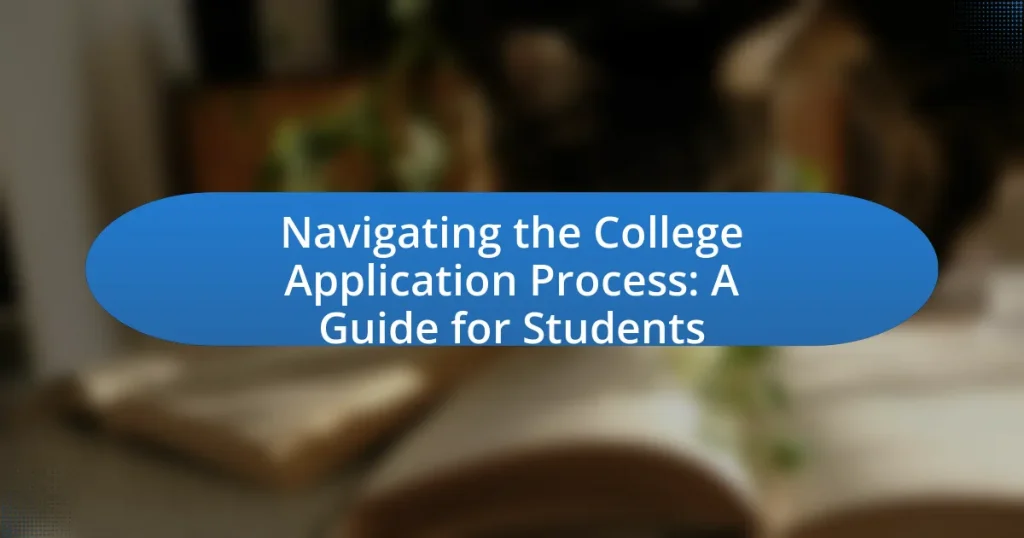The article “Navigating the College Application Process: A Guide for Students” provides a comprehensive overview of the steps involved in applying for college admission. It outlines the importance of the application process, key stages such as researching colleges, preparing materials, and submitting applications, as well as the differences between college and high school applications. The article details common components required for applications, including transcripts, standardized test scores, and personal statements, while also addressing the significance of extracurricular activities and recommendation letters. Additionally, it offers strategies for effective preparation, managing deadlines, and overcoming challenges, along with resources available to assist students throughout the process.

What is the College Application Process?
The college application process is a series of steps that prospective students must complete to apply for admission to a college or university. This process typically includes researching colleges, preparing application materials such as transcripts and essays, submitting standardized test scores, and completing the application forms by specified deadlines. According to the National Association for College Admission Counseling, 70% of colleges require standardized test scores, while 90% require high school transcripts, highlighting the importance of these components in the application process.
Why is the College Application Process important for students?
The college application process is important for students because it serves as a critical gateway to higher education opportunities. This process allows students to showcase their academic achievements, extracurricular involvement, and personal qualities to potential colleges, which can significantly influence admission decisions. According to the National Association for College Admission Counseling, 75% of colleges consider a student’s high school GPA as a primary factor in admissions, highlighting the importance of presenting a strong academic record during this process. Additionally, the application process helps students develop essential skills such as time management, self-reflection, and goal setting, which are valuable in both academic and professional settings.
What are the key stages in the College Application Process?
The key stages in the college application process include researching colleges, preparing application materials, submitting applications, and following up. Researching colleges involves identifying institutions that align with academic and personal goals, which is essential for making informed choices. Preparing application materials includes gathering transcripts, letters of recommendation, and personal statements, all of which are critical for presenting a strong application. Submitting applications is the formal step where candidates send their completed materials to chosen colleges, often adhering to specific deadlines. Finally, following up entails checking application statuses and responding to any additional requests from colleges, ensuring that all requirements are met. Each of these stages is crucial for a successful college application experience.
How does the College Application Process differ from high school applications?
The College Application Process differs from high school applications primarily in its complexity and requirements. College applications typically require standardized test scores, personal essays, letters of recommendation, and a detailed account of extracurricular activities, while high school applications often focus on basic academic records and a simpler application form. Additionally, college applications may involve interviews and specific program requirements, reflecting a more competitive and individualized selection process. This complexity is supported by the fact that, according to the National Association for College Admission Counseling, 85% of colleges consider high school GPA and standardized test scores as critical factors in admissions decisions, highlighting the rigorous evaluation criteria in college applications compared to high school admissions.
What are the common components of a college application?
The common components of a college application include the application form, high school transcripts, standardized test scores, letters of recommendation, a personal statement or essay, and an application fee. Each of these elements plays a crucial role in the evaluation process. For instance, the application form provides essential personal information, while high school transcripts reflect academic performance. Standardized test scores, such as the SAT or ACT, offer a benchmark for assessing student readiness. Letters of recommendation provide insights into a student’s character and abilities from educators. The personal statement or essay allows applicants to express their individuality and motivations. Lastly, the application fee is often required to process the application. These components collectively help colleges assess applicants holistically.
What documents are typically required for college applications?
Typically, college applications require several key documents, including a completed application form, high school transcripts, standardized test scores (such as SAT or ACT), letters of recommendation, and a personal statement or essay. High school transcripts provide a record of academic performance, while standardized test scores demonstrate proficiency in core subjects. Letters of recommendation offer insights into a student’s character and abilities from teachers or mentors, and the personal statement allows applicants to express their motivations and goals. These documents collectively help admissions committees assess a candidate’s readiness for college-level work.
How do personal statements and essays impact the application?
Personal statements and essays significantly impact college applications by providing insight into an applicant’s personality, experiences, and motivations. These written components allow admissions committees to assess qualities that grades and test scores cannot convey, such as resilience, creativity, and personal growth. Research indicates that 70% of admissions officers consider personal statements as a critical factor in their decision-making process, highlighting their importance in distinguishing candidates with similar academic qualifications.
What role do standardized tests play in the College Application Process?
Standardized tests serve as a critical component in the college application process by providing a uniform measure of academic readiness for prospective students. These tests, such as the SAT and ACT, are used by many colleges and universities to assess applicants’ knowledge and skills in areas like mathematics, reading, and writing. Research indicates that standardized test scores can correlate with college success, as evidenced by a study from the College Board, which found that students with higher SAT scores tend to perform better in their first year of college. Additionally, standardized tests can help colleges compare applicants from diverse educational backgrounds, offering a common metric for evaluation.
What are the most common standardized tests required by colleges?
The most common standardized tests required by colleges are the SAT and ACT. These tests assess students’ readiness for college-level work and are widely accepted by institutions across the United States. The SAT, administered by the College Board, includes sections on reading, writing, and math, while the ACT covers English, math, reading, and science reasoning. According to the College Board, over 2.2 million students took the SAT in 2021, and the ACT reported approximately 1.3 million test-takers in the same year, demonstrating their prevalence in college admissions processes.
How can students prepare effectively for these tests?
Students can prepare effectively for tests by creating a structured study plan that includes regular practice, review of key concepts, and taking practice exams. Research indicates that spaced repetition and active recall techniques enhance retention and understanding of material, which are crucial for test performance. For instance, a study published in the journal “Psychological Science” found that students who engaged in spaced practice scored significantly higher on tests compared to those who crammed. Additionally, utilizing resources such as test prep books, online courses, and study groups can provide diverse perspectives and reinforce learning.
How can students choose the right colleges to apply to?
Students can choose the right colleges to apply to by assessing their academic interests, career goals, and personal preferences. First, students should identify their desired major or field of study, as this will help narrow down institutions that offer strong programs in those areas. Additionally, students should consider factors such as location, campus culture, size, and available resources, which can significantly impact their college experience.
Research indicates that 70% of students who visit campuses report a better understanding of their fit with the institution, highlighting the importance of campus visits in the decision-making process. Furthermore, utilizing college ranking systems and resources like the U.S. News & World Report can provide insights into academic quality and student satisfaction. By combining personal reflection with thorough research, students can make informed choices about which colleges align best with their aspirations and values.
What factors should students consider when selecting colleges?
Students should consider academic programs, location, cost, campus culture, and support services when selecting colleges. Academic programs are crucial as they determine the quality and relevance of education; for instance, a college known for strong engineering programs may be preferable for an aspiring engineer. Location affects lifestyle and opportunities, with urban colleges often providing more internships and networking options. Cost is a significant factor, as tuition and living expenses can vary widely; according to the College Board, the average annual cost of tuition and fees for public four-year colleges was approximately $10,740 for in-state students and $27,560 for out-of-state students in 2021-2022. Campus culture influences student experience, with factors like diversity, extracurricular activities, and social life playing a role in personal satisfaction. Lastly, support services, including academic advising, mental health resources, and career counseling, are essential for student success and well-being.
How can students research colleges effectively?
Students can research colleges effectively by utilizing a combination of online resources, campus visits, and networking with current students and alumni. Online platforms such as college websites, college ranking sites, and forums provide essential information about programs, admission requirements, and campus culture. According to the National Center for Education Statistics, 85% of students use the internet as their primary source for college information. Additionally, visiting campuses allows students to experience the environment firsthand and ask questions directly to faculty and staff. Engaging with current students and alumni through social media or college fairs can provide personal insights and experiences that are invaluable in making informed decisions.
What strategies can students use to enhance their applications?
Students can enhance their applications by focusing on strong academic performance, engaging in extracurricular activities, and crafting compelling personal statements. Strong academic performance, evidenced by high GPA and standardized test scores, demonstrates a student’s readiness for college-level work. Participation in extracurricular activities, such as clubs, sports, or volunteer work, showcases leadership skills and a well-rounded character, which are valued by admissions committees. Additionally, a well-written personal statement that reflects genuine experiences and aspirations can significantly impact an application, as it provides insight into the student’s personality and motivations. Research indicates that admissions officers prioritize these elements when evaluating candidates, making them essential strategies for students aiming to strengthen their applications.
How important are extracurricular activities in the application process?
Extracurricular activities are highly important in the college application process. They provide admissions committees with insights into a student’s interests, skills, and character beyond academic performance. Research from the National Association for College Admission Counseling indicates that 70% of colleges consider extracurricular involvement as a significant factor in admissions decisions. This involvement can demonstrate leadership, commitment, and the ability to balance multiple responsibilities, which are qualities that colleges value in prospective students.
What role do recommendation letters play in college admissions?
Recommendation letters play a crucial role in college admissions by providing insight into a student’s character, work ethic, and academic abilities from the perspective of teachers or mentors. These letters complement the student’s application by offering qualitative assessments that standardized test scores and grades may not fully capture. Research indicates that admissions committees often consider recommendation letters as a significant factor in their decision-making process, with 70% of colleges stating that they value these letters highly in evaluating applicants. This emphasis on personal insights helps colleges identify candidates who not only excel academically but also demonstrate qualities such as leadership, resilience, and collaboration.
How can students manage deadlines and timelines during the application process?
Students can manage deadlines and timelines during the application process by creating a detailed schedule that outlines all important dates and tasks. This schedule should include application deadlines, standardized test dates, and time allocated for gathering materials such as transcripts and recommendation letters. Research indicates that students who use planners or digital tools to track their progress are more likely to meet deadlines effectively. For instance, a study by the National Center for Education Statistics found that organized students tend to have higher success rates in completing applications on time. By regularly reviewing and adjusting their schedules, students can ensure they stay on track and avoid last-minute stress.
What are the key deadlines students should be aware of?
Key deadlines students should be aware of include application submission dates, financial aid deadlines, and enrollment confirmation dates. For instance, many colleges have early decision deadlines around November 1, regular decision deadlines typically by January 1, and financial aid applications often due by February 1. These dates are crucial as missing them can result in lost opportunities for admission and funding.
How can students create an effective timeline for their applications?
Students can create an effective timeline for their applications by starting early and breaking down the application process into manageable steps. This involves identifying key deadlines for standardized tests, application submissions, and financial aid forms, which are typically outlined on college websites. For instance, many colleges have early decision deadlines in November and regular decision deadlines in January.
To ensure all tasks are completed on time, students should create a calendar that includes these deadlines, along with personal milestones such as completing essays, gathering recommendation letters, and preparing for interviews. Research indicates that students who plan their application timeline effectively are more likely to submit high-quality applications, as they allow ample time for revisions and feedback.
By using tools like digital calendars or project management apps, students can set reminders and track their progress, ensuring they stay organized and focused throughout the application process.
What are the common challenges students face during the College Application Process?
Students commonly face several challenges during the college application process, including time management, financial concerns, and the complexity of application requirements. Time management issues arise as students juggle academic responsibilities, extracurricular activities, and application deadlines, often leading to stress and incomplete submissions. Financial concerns are significant, as students must navigate tuition costs, application fees, and potential student loans, which can deter some from applying to their desired institutions. Additionally, the complexity of application requirements, such as personal statements, recommendation letters, and standardized test scores, can overwhelm students, making it difficult to present themselves effectively to admissions committees. These challenges are well-documented in studies, such as the National Association for College Admission Counseling’s report, which highlights the impact of these factors on students’ application experiences.
How can students overcome anxiety related to college applications?
Students can overcome anxiety related to college applications by implementing structured planning and seeking support. Establishing a timeline for application tasks reduces uncertainty and helps manage workload, while engaging with peers, family, or counselors provides emotional support and practical advice. Research indicates that students who utilize organizational tools and social support systems report lower levels of anxiety during the application process. For instance, a study published in the Journal of College Admission found that students who participated in peer support groups experienced a significant decrease in stress levels compared to those who did not.
What should students do if they miss an application deadline?
Students who miss an application deadline should immediately contact the admissions office of the institution to inquire about possible options for late submission. Many colleges have policies in place that may allow for late applications under certain circumstances, such as extenuating personal situations or technical difficulties. Additionally, students should prepare to explain their reasons for missing the deadline and provide any necessary documentation to support their case. It is crucial to act quickly, as some institutions may have strict policies regarding late applications, while others may be more flexible.
What are the best practices for submitting a successful college application?
The best practices for submitting a successful college application include thorough research on colleges, meeting deadlines, and crafting a compelling personal statement. Researching colleges allows applicants to tailor their applications to specific programs and values, increasing their chances of acceptance. Meeting deadlines is crucial, as late submissions can disqualify candidates; for instance, the National Association for College Admission Counseling reports that timely applications significantly enhance admission prospects. Crafting a compelling personal statement showcases individuality and passion, which admissions committees prioritize; a study by the College Board indicates that personal essays can influence decisions in 25% of cases.
How can students ensure their application is complete and accurate?
Students can ensure their application is complete and accurate by meticulously reviewing each section of the application and cross-referencing it with the requirements outlined by the institution. This includes checking that all required documents, such as transcripts, recommendation letters, and personal statements, are submitted and formatted correctly. Additionally, students should utilize application checklists provided by colleges, which often detail necessary components and deadlines. According to the National Association for College Admission Counseling, 75% of applicants who follow a checklist report feeling more confident in their submission. Regularly seeking feedback from teachers or counselors can also help identify any errors or omissions, further enhancing the accuracy of the application.
What tips can help students stand out in their applications?
To stand out in their applications, students should focus on showcasing their unique experiences and perspectives. Highlighting personal stories, achievements, and challenges faced can create a compelling narrative that resonates with admissions committees. For instance, a study by the National Association for College Admission Counseling found that 75% of colleges consider personal essays as a significant factor in admissions decisions, indicating the importance of a well-crafted narrative. Additionally, students should seek to demonstrate their passion for their chosen field through relevant extracurricular activities, volunteer work, or internships, as these experiences can provide concrete evidence of their commitment and skills.
What resources are available to assist students in the College Application Process?
Various resources are available to assist students in the college application process, including online platforms, school counseling services, and community organizations. Online platforms like Common App and Coalition App streamline application submissions and provide guidance on requirements for multiple colleges. School counseling services offer personalized advice, workshops, and access to college fairs, helping students navigate deadlines and application materials. Additionally, community organizations often provide mentorship programs, financial aid workshops, and resources tailored to underrepresented students, ensuring comprehensive support throughout the application journey.
How can guidance counselors support students during this process?
Guidance counselors can support students during the college application process by providing personalized advice and resources tailored to each student’s needs. They assist in identifying suitable colleges based on academic interests and career goals, helping students create a balanced list of schools. Counselors also guide students in preparing application materials, such as personal statements and resumes, ensuring that these documents effectively showcase the students’ strengths. Furthermore, they offer insights into financial aid options and scholarship opportunities, which are crucial for making college accessible. Research indicates that students who engage with guidance counselors during this process are more likely to submit applications on time and receive acceptance offers, highlighting the importance of this support.
What online tools and platforms can help students with applications?
Online tools and platforms that can help students with applications include Common App, which allows students to apply to multiple colleges with one application, and College Board’s Big Future, which provides resources for college planning and application tracking. Additionally, platforms like Cappex and Niche offer college search tools and application advice, while Grammarly assists with writing quality in personal statements and essays. These tools streamline the application process, making it more efficient and organized for students.
What final advice can help students navigate the College Application Process successfully?
To successfully navigate the College Application Process, students should start early and create a detailed timeline that includes application deadlines, standardized test dates, and required materials. This proactive approach allows students to manage their time effectively, reducing stress and ensuring that all components of their applications are completed thoroughly. Research indicates that students who plan ahead are more likely to submit higher-quality applications, as they have ample time to seek feedback and make revisions.


